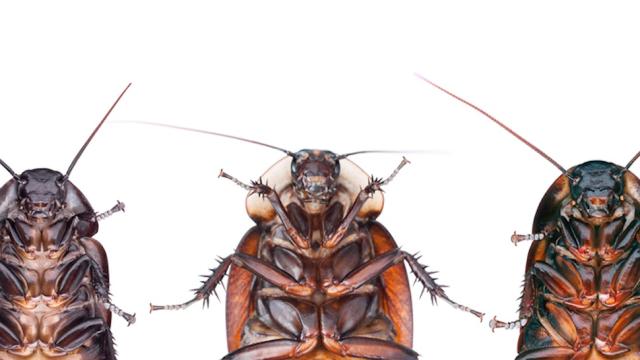Think twice before stomping the lights out of the next cockroach you come across — you’re going to want them to return the favour after the takeover. Thanks to new research on this most vexatious blight of mankind, we can now say more or less definitively that the despised cockroach will, in fact, come to rule us all. Because, apparently, they’re developing the ability to outsmart our attempts at poisoning them dead.
Cockroaches have had 350 million years of evolutionary practice at becoming immune to threats in their environment, and the battle against their newest enemy — us — is going just as swimmingly. Published in Science this past Thursday, the report, Changes in Taste Neurons Support the Emergence of an Adaptive behaviour in Cockroaches, outlined how certain populations of the bug have actually altered their internal chemistry to find the taste of glucose repugnant. Because what’s usually the first thing you do after seeing a cockroach? Have an irrationally loud, psychological breakdown before going out to buy a roach motel coated in sticky, delicious, sugar-flavoured poison.
Exterminators (or as the New York Times notes to be their preferred moniker, pest management professionals) began using this method in the early ’90s instead of the old standby — wildly spraying poison around the rooms where you and your loved ones live and eat. As the cockroaches slowly came to find the traps repellant, it had always been assumed that they were becoming immune to the actual poison being used, not its glucose guise.
But as the researchers were studying the cockroaches, which use little hairs on their bodies to detect either sweetness or bitterness, they realised that the roaches had changed the way their brains received impulses from these receptors. Instead of the sweet hairs firing off a “sweet” signal, they’d shoot of a message of bitterness.
Their evolutionary attempts at evasion aren’t all bad news. Studying the way these bugs have changed could offer insight into how best to fight against malaria-carrying mosquitos. According to Coby Schal, one of the researchers at North Caroline State University:
The mosquito changed its behaviour, and no longer rests on walls that are treated with insecticide. Instead it tends to rest on the ceiling, or it tends to rest on the outside walls that are not treated with insecticide. We still don’t understand the cellular, the neural mechanism responsible for this change in behaviour of the mosquito.
So at least we might be able to do some good with the newfound knowledge before our future cockroach overlords come to power. You know, assuming the cicadas don’t get us first. Stay vigilant, friends. [New York Times]
Picture: Shutterstock/skydie
